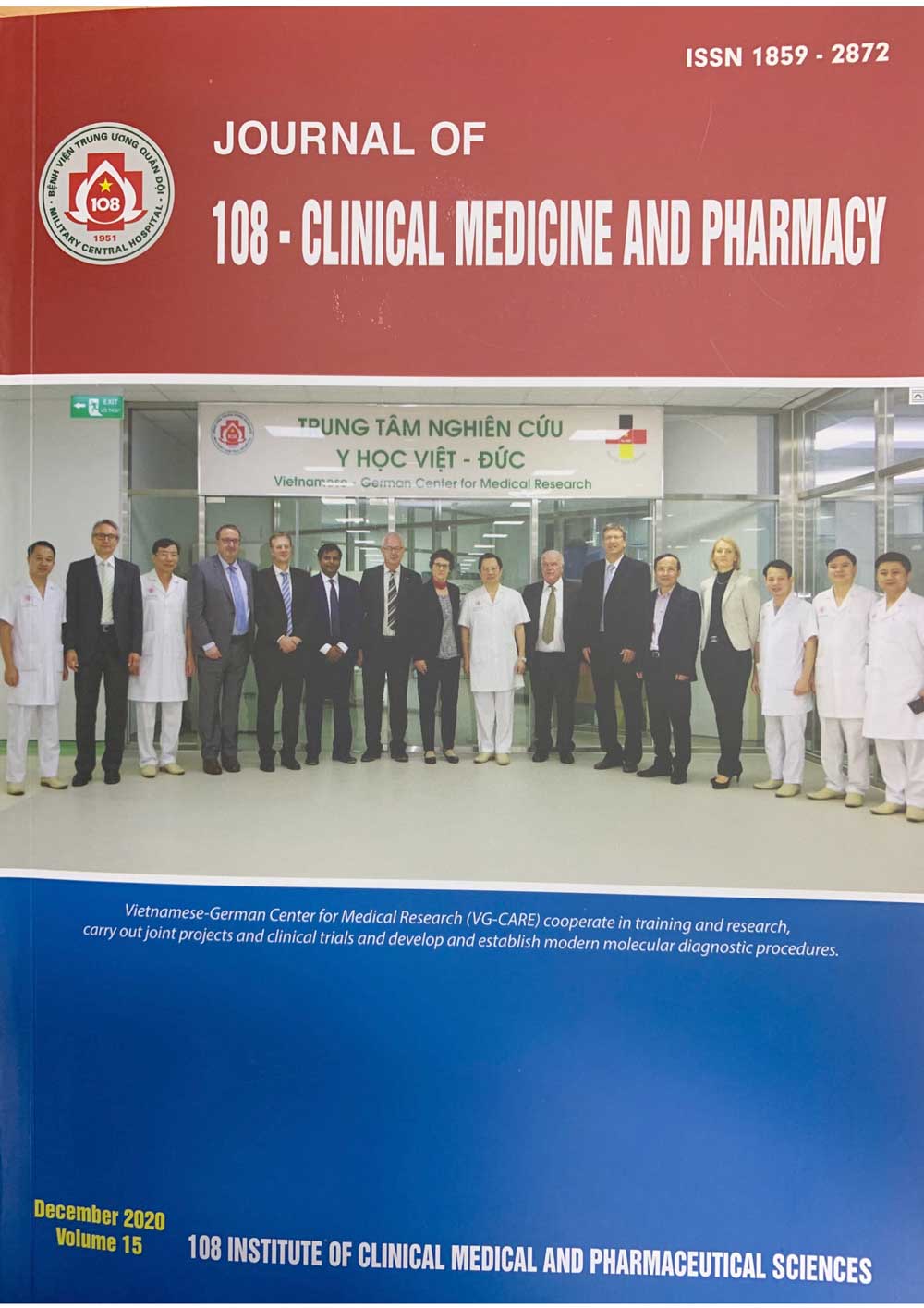Association of PD-1.9 polymorphism with the risk of HBV-related hepatocellular carcinoma
Main Article Content
Keywords
Abstract
Objective: This case-control study aimed to determine the association between PD-1.9 polymorphism and the risk of HCC in the cohort of chronic HBV-infected patients. Subject and method: Genotyping of PD-1.9 polymorphism was performed by direct sanger sequencing in 499 HBV-infected patients. Patients were assigned into two groups, including CHB (n = 193) and HCC (n=306) based on clinical manifestations. Binary logistic regression adjusted for age and gender was performed to analyze the association of PD-1.9 variant with liver disease progression applying for different genetic models. Result: The frequencies of genotype PD-1.9 TT and minor allele T were significantly higher in HCC patients compared to CHB patients; genotype PD-1.9 TT: co-dominant model, OR = 2.1 (1.01-4.3), padj=0.047 and recessive model, OR = 1.8 (1.1-3.6), padj=0.042; allele PD-1.9 T: OR = 1.3 (1.1-1.8), padj=0.029. In addition, AFP levels were significantly higher in patients with genotype PD-1.9 TT compared to CT/CC genotype. Conclusion: This study, for the first time, reveals the association between PD-1.9 variant and the risk of HCC development in chronic HBV infection.
Article Details
References
2. Shuai Z, Leung MW, He X, Zhang W, Yang G, Leung PS (2016) Eric GM: Adaptive immunity in the liver. Cell MolImmunol 13(3): 354-368.
3. Chang JJ, Lewin SR (2007) Immunopathogenesis of hepatitis B virus infection. ImmunolCell Biol 85(1): 16-23.
4. Peng G, Li S, Wu W, Tan X, Chen Y, Chen Z (2008) PD-1 upregulation is associated with HBV-specific T cell dysfunction in chronic hepatitis B patients. Mol Immunol 45(4): 963-970.
5. Zhang G, Liu Z, Duan S, Han Q, Li Z, Lv Y, Chen J, Lou S, Li N (2010) Association of polymorphisms of programmed cell death-1 gene with chronic hepatitis B virus infection. Hum Immunol 71(12): 1209-1213.
6. Huang C, Ge T, Xia C, Zhu W, Xu L, Wang Y, Wu F, Liu F, Zheng M, Chen Z (2019) Association of rs10204525 genotype GG and rs2227982 CC combination in programmed cell death 1 with hepatitis B virus infection risk. Medicine (Baltimore) 98(35): 16972.
7. Hou Z, Zhou Q, Lu M, Tan D, Xu X (2017) A Programmed Cell Death-1 haplotype is associated with clearance of Hepatitis B virus. Ann Clin Lab Sci 47(3): 334-343.
8. Zhang J, Zhao T, Xu C, Huang J, Yu H (2016) The association between polymorphisms in the PDCD1 gene and the risk of cancer: A PRISMA-compliant meta-analysis. Medicine (Baltimore) 95(40): 4423.
9. Dong W, Gong M, Shi Z, Xiao J, Zhang J, Peng J: Programmed Cell Death-1 Polymorphisms Decrease the Cancer Risk (2016) A meta-analysis involving twelve case-control studies. PLoS One 11(3): 0152448.
10. Hashemi M, Karami S, Sarabandi S, Moazeni-Roodi A, Malecki A, Ghavami S, Wiechec E (2019) Association between PD-1 and PD-L1 polymorphisms and the risk of cancer: A meta-analysis of case-control studies. Cancers (Basel) 11(8): 1150.
11. Isogawa M, Chung J, Murata Y, Kakimi K, Chisari FV (2013) CD40 activation rescues antiviral CD8(+) T cells from PD-1-mediated exhaustion. PLoS Pathog 9(7): 1003490.
12. Cheng HY, Kang PJ, Chuang YH, Wang YH, Jan MC, Wu CF, Lin CL, Liu CJ, Liaw YF, Lin SM et al (2014) Circulating programmed death-1 as a marker for sustained high hepatitis B viral load and risk of hepatocellular carcinoma. PLoS One 9(11): 95870.
 ISSN: 1859 - 2872
ISSN: 1859 - 2872
